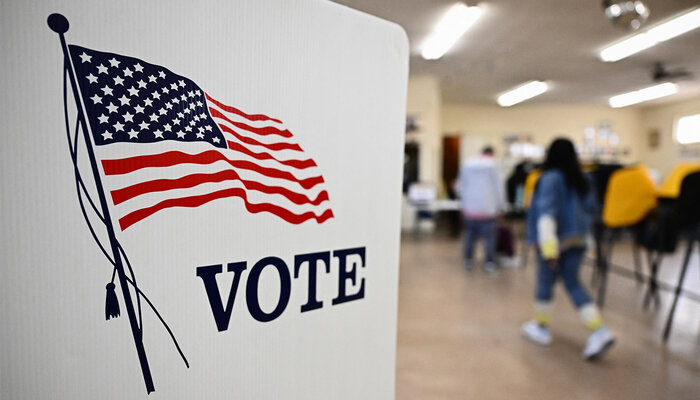Attacks on ERIC Since the 2020 Election
After Donald Trump lost the 2020 presidential election, his supporters raised questions about numerous aspects of election administration, including voter list maintenance, to sow doubts about the integrity of U.S. elections.
As part of this campaign, election deniers went after ERIC. Starting in January 2022, a far-right outlet, Gateway Pundit, posted a series of pieces falsely accusing ERIC of being a front for liberal interests and implying that it was doing something other than identifying potential inaccuracies in state voter rolls. They spurred a campaign among both activists and Republican party leaders like Donald Trump pressuring state officials to withdraw from ERIC. And nine Republican-led states did leave, including states whose leaders had recently touted their membership in ERIC as a best practice.
Without membership in ERIC, states may lack reliable methods of updating their rolls when registrants move, making it harder for them to communicate with voters and direct them to the right polling location. In turn, this increases the risk of voters being prevented from voting or forced to vote by provisional ballots, which themselves can delay vote counting. States that refuse to be part of ERIC also give up the best tool for ensuring that voter rolls contain only eligible voters. As Al Smith, Pennsylvania’s Republican secretary of the commonwealth, put it, “The perversity with a lot of this is that the arguments against ERIC are allegedly coming from a place of interest in election integrity, when in reality, ERIC is quite possibly the most valuable, useful tool that we have to strengthen election integrity.”
While states can purchase data from the U.S. Postal Service’s National Change of Address Registry, those data cannot replace ERIC. Residents may fill out a change-of-address form whenever they need to receive mail elsewhere, which is frequently for temporary reasons that do not affect their voting eligibility: for example, they’re studying elsewhere, have a temporary work assignment, or are caring for a sick family member. In addition, individuals may be inaccurately flagged because they share a name with someone else who moved or because a member of their household moved and accidentally checked the “family” box rather than the “individual” box. ERIC accounts for these issues by cross-referencing change-of-address reports to its in-state and cross-state movers’ reports.
Recognizing that change-of-address data isn’t sufficient to update voter rolls, states that have left ERIC have been exploring other interstate data-sharing agreements. It remains to be seen whether these will share the kind of sensitive data that enables ERIC to make precise matches, how many sources they’ll be able to access, how good their matching technology will be, and whether they’ll include adequate privacy protections for whatever sensitive data they do collect. Regardless, these efforts will be far less effective and cost-effective than ERIC, which enables 24 states plus the District of Columbia to share their data — particularly Department of Motor Vehicle data —and to share the cost of purchasing federal data.
Even more concerning, some private organizations have begun developing matching software to “replace” ERIC and are working to place it in the hands of both election officials and private activists, even in states that continue to participate in ERIC. Among various programs being floated, one appears to have generated particular enthusiasm: EagleAI. EagleAI pulls data from various sources — such as the National Change of Address Registry, “Google scrapes,” business records, and property tax records — and identifies potential inconsistencies that may or may not constitute evidence that a registered voter has moved or is otherwise ineligible to vote where registered. Because most states allow private citizens to challenge voter registrations before and during an election and essentially force election officials to review those challenged registrations, EagleAI’s strategy appears to be twofold: train volunteers to use this software to file large volumes of challenges, and pitch the same software to election officials as a tool for adjudicating those and other challenges. In the recent past, mass challenges have not always been responsibly handled and have sometimes resulted in improper, large-scale voter purges.
Though EagleAI’s proponents pitch it as nonpartisan, internal planning documents indicate it’s funded by Donors Trust, a dark money conservative group that also funds election denial efforts. It’s being rolled out specifically to activists associated with right-wing election denial groups such as the Election Integrity Network that are trying to organize mass voter challenges to state voter rolls.
As described to potential users in these rollouts, the software is designed to autofill various fields in a state’s challenge form, making it easy for users to quickly complete a large volume of these forms. Also as described, once a registration has been flagged for challenging, EagleAI then stores the form with others to be submitted to election offices en masse on the last day for filing challenges — maximizing the chaos by minimizing the time officials have to decide whether to take the serious step of removing voters from the rolls. Because some state laws require that challengers live in the same jurisdiction as the registrants they challenge, EagleAI’s promoters are enlisting local voters to submit challenges compiled by other activists. This approach could conflict with certain state laws, and it certainly conflicts with the original rationale for private challenges — that they serve as a way for people to contribute knowledge about their local community. All this looks suspiciously like a recipe for overwhelming election offices and increasing the risk that some eligible voters will be incorrectly removed from the rolls.
Indeed, EagleAI’s supporters are pitching the software to local election officials as a way to update their rolls, prescreen voter registration forms, and respond to “15,000 challenges on a spreadsheet” that they “don’t know what to do with.” In a private training session, EagleAI’s founder openly celebrated that election officials “can’t respond” to mass challenges on short notice, and therefore may be looking to “outsource their headache” to EagleAI.
EagleAI has reached out to numerous state and local officials and has acquired at least one government contract. In Georgia, the Columbia County Board of Canvassers used taxpayer money to purchase EagleAI licenses, even though state election officials advised the board that EagleAI would not improve the accuracy of county voting rolls, which are already updated using ERIC’s reports. While the board has said it’s only using EagleAI to flag registrations for review, reports and internal documents indicate that EagleAI is promoting itself to the board as a tool to vet voting registration applications, flag registered voters for removal, and even resolve challenges.
EagleAI appears to use the Voter Reference Foundation’s (VoteRef) publicly available voter list as one of its data sources. VoteRef, itself substantially funded by a single right-wing, election-denying donor, provides only a snapshot of dynamic voter registration lists that quickly becomes outdated and often lacks critical data like date of birth, which raises the risk of false matches based on name similarities. Internal EagleAI planning documents and public statements by its founder raise concerns that activists might target certain vulnerable populations, such as nursing home residents, homeless individuals, and individuals from immigrant communities. And EagleAI’s backers have made misleading statements about current voter rolls. For example, they claim that Georgia has more registered voters than residents based on a list of registered voters that included names already flagged for possible removal by the state. They also conflate routine list inaccuracies like typos with actually ineligible voters. As summed up by Georgia Elections Director Blake Evans, “Instead of asking questions or being curious about the data, EagleAI draws inaccurate conclusions and then spreads them as if they are facts.”
Beyond these specific concerns, it’s troubling that some local election officials are turning to a little-known software tool promoted by election denial activists rather than well-studied and externally audited software maintained by a bipartisan organization led by state election officials with a transparent membership agreement and bylaws. While ERIC posts comprehensive information about its membership and internal processes and safeguards, EagleAI does not. And it’s alarming that election-denial activists seem poised to organize mass challenges to registered voters and intentionally bring these challenges at the last minute, when election staff may have limited bandwidth to vet them adequately.
In short, both public and private initiatives to replace ERIC pose a high risk of disenfranchising voters and sowing misinformation about voter roll accuracy.



